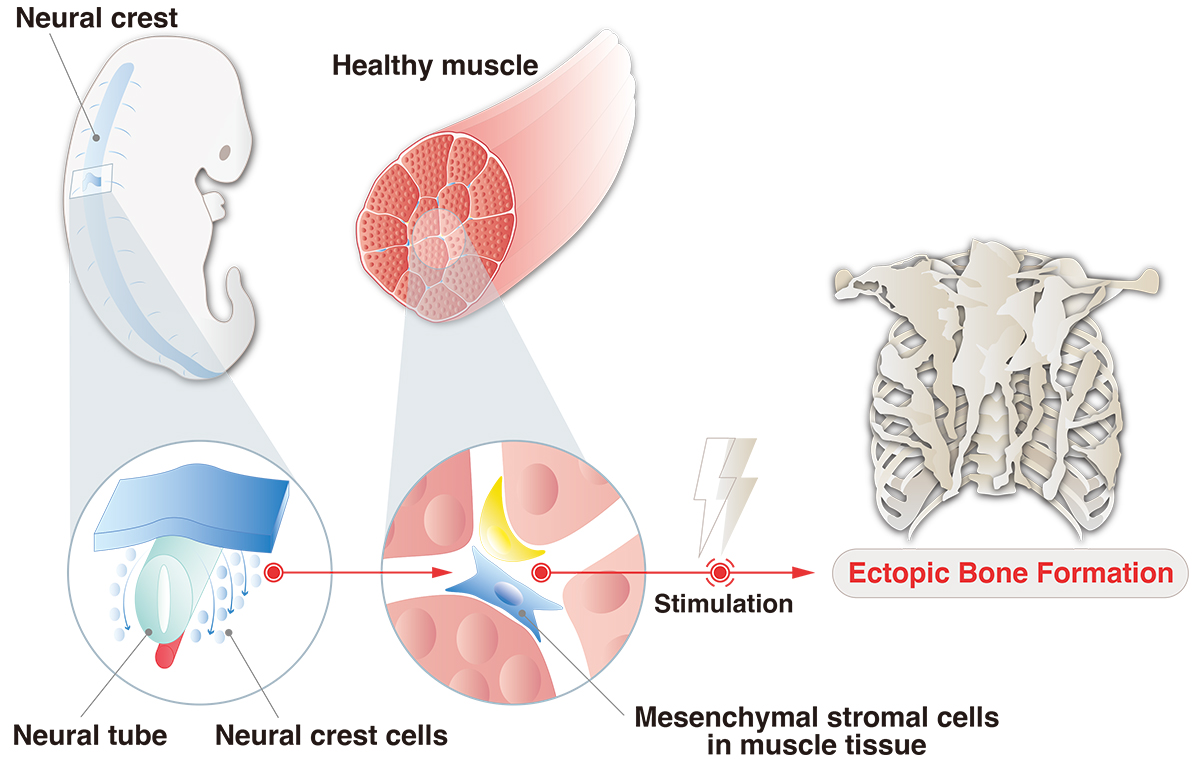
Research Activities
Research Activities
Publications
June 12, 2023
Unveiling the origins of ectopic bones: Insights from neural crest cell research
To accurately study pathological conditions using cultured cells, it is crucial to use cells that either cause the disease or closely resemble the disease-causing cells. Induced pluripotent stem cells (iPSCs) can differentiate into various cell types, thus making them an ideal tool for modeling diseases. However, to effectively utilize iPSCs, it is critical to understand how disease-causing cells are formed during embryonic development.
Ectopic ossification is a condition characterized by the formation of bone in tissues where it does not normally occur. It can result from trauma or surgery but can also be caused by genetic mutations in some cases, such as in fibrodysplasia ossificans progressiva (FOP), a rare genetic disorder. Previous murine studies have shown that ectopic bones originate from mesenchymal stromal cells in muscle tissues rather than muscle cells themselves. However, the specific origin of these mesenchymal stromal cells remained unknown.
The research group has now discovered these mesenchymal stromal cells to originate from neural crest cells, which are transient cells that appear during embryonic development. This finding provides a crucial scientific basis for detailed studies on ectopic bone formation. By understanding the cellular origins of ectopic bones, researchers can utilize iPSCs to generate mesenchymal stromal cells via neural crest cells, enabling more accurate and effective studies on ectopic bone formation.
Moreover, the implications of this research extend beyond ectopic ossification. Mesenchymal stromal cells in muscle tissues play a vital role in muscle homeostasis and regeneration. Therefore, the findings of this study not only contribute to the understanding of ectopic bone formation but also have the potential to aid in developing novel therapeutic approaches for skeletal muscle-related disorders caused by mesenchymal stromal cells.
In conclusion, the study highlights the significance of neural crest cells in ectopic bone formation and validates the use of iPSC-derived mesenchymal stromal cells to study this pathophysiologic process. This research opens the door for further investigations and may ultimately lead to the development of new treatments for various bone and muscle-related disorders related to mesenchymal stromal cells.
The results of this study were published online in Genes & Diseases on May 29, 2023.

Paper Details
- Journal: Genes & Diseases
- Title: Myelin protein zero (P0)- and Wnt1-Cre marked muscle resident neural crest-derived mesenchymal progenitor cells give rise to heterotopic ossification in mouse models
- Authors:
Chengzhu Zhao1,2, Yoshiko Inada1, Kazuya Sekiguchi3,4, Kyosuke Hino3,5, Megumi Nishio3, Yasuhiro Yamada6, Shuichi Matsuda4, Junya Toguchida3,4,7, Makoto Ikeya1*
* Corresponding authors - Author Affiliations:
- Department of Clinical Application, Center for iPS Cell Research and Application (CiRA), Kyoto University
- Laboratory of Skeletal Development and Regeneration, Institute of Life Sciences, Chongqing Medical University
- Department of Cell Growth and Differentiation, Center for iPS Cell Research and Application (CiRA), Kyoto University
- Department of Orthopaedic Surgery, Graduate School of Medicine, Kyoto University
- Regenerative & Cellular Medicine Kobe Center, Sumitomo Pharma Co., Ltd.
- Division of Stem Cell Pathology, Center for Experimental Medicine and Systems Biology, Institute of Medical Science, University of Tokyo
- Department of Regeneration Sciences and Engineering, Institute for Frontier Life and Medical Sciences, Kyoto University






















